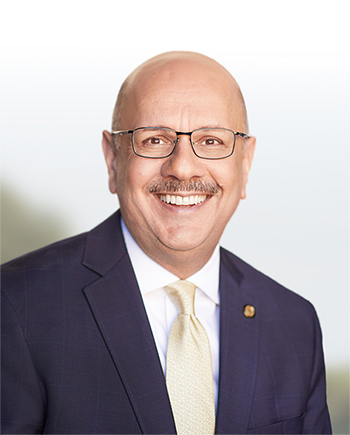Dear CMU Ambassadors,
Commencement is the most joyous event each year at Carnegie Mellon, and this year, the excitement was tripled as we celebrated the past three graduating classes during ceremonies over multiple days. It was the largest Commencement in the university’s history and the first fully in-person ceremony since 2019 — capping a year when most of our classes, research activities and campus traditions were able to resume in traditional settings, even as we, like the rest of the world, continued to adapt to the ongoing pandemic. Still, hosting an in-person Commencement was an important milestone, and the weekend was an unparalleled success.
During the events, we bestowed honorary degrees on trailblazers spanning science and technology, the arts and humanities, and national defense and business. Esteemed alumnus Billy Porter, academic and politician Manuel Heitor, and Nobel Laureate Frances Arnold served as our keynote speakers. Other honorary degree recipients included Professor Evelyn Brooks Higginbotham, Lt. Gen. Jody J. Daniels, CMU University Professor Raj Reddy, and former Chair of the CMU Board of Trustees Jim Rohr. It was a truly impressive group!
The stories included in this edition of CMU Ambassadors are further evidence of the university’s accelerating momentum at the nexus of technology and humanity.
All of us eagerly await the launch of the Iris rover, a student-built robot that is scheduled to be carried to the moon later this year. It will be a first on many fronts: first student-led, first university, first uncrewed U.S. lunar rover in history. And it will be followed by an even more capable rover, MoonRanger, likely launching next year. Both projects are guided by our legendary robotics University Professor and alumnus Red Whittaker.
Back on Earth, robots have become ubiquitous and are even more critical amid the pandemic-related labor shortages. But how do you design them to operate safely in workspaces, both with each other and with humans? A series of research projects aims to leverage CMU expertise in advanced manufacturing, robotics and artificial intelligence to develop warehouse robots for the future.
Technology also plays a critical role for safety and efficiency on city streets, where vehicles, pedestrians and riders on bicycles and scooters occupy the same lanes. Traffic21, our leading-edge research group, was featured in Popular Science for its Surtrac system, which uses artificial intelligence to create smart signals and intersections that move traffic more smoothly and safely. It even reduces vehicle emissions by shortening idling times.
Our humanities and social science scholars are using technology in innovative ways, too. A pair of research projects spanning multiple disciplines have received National Endowment for the Humanities grants to use technology to unlock the identities of anonymous printers of controversial texts from the late 1600s and create immersive, Shakespearean experiences through virtual reality. And a psychology project extends University Professor Marcel Just’s groundbreaking use of functional MRI scans to understand if people from different cultures and languages process abstract concepts in the same parts of their brains.
One of the most remarkable characteristics of our CMU community is its ability to give voice to a previously unidentified issue and articulate solutions based on scholarly research. The Financial Times interviewed four eminent scholars who did just that, including three from CMU — Linda Babcock, Brenda Peyser and Laurie Weingart — and one from the University of Pittsburgh, Lise Vesterlund, about their new book, “The No Club: Putting a Stop to Women’s Dead-End Work.” Their book illustrates how women often are asked to perform workplace tasks that do not advance their careers, and offers resources for both employees and employers for how to build a more equitable culture.
And finally, the impact of Make Possible: The Campaign for Carnegie Mellon University and its generous supporters continues to resonate across campus. This spring, we celebrated the opening of TCS Hall, a new research and collaboration facility. Alumnus Giorgio Coraluppi made a gift to endow the headship for the Department of Electrical and Computer Engineering, and the university installed Keith Webster as the inaugural Helen and Henry Posner, Jr. Dean’s Chair for the University Libraries, made possible by a grant from the Posner Foundation of Pittsburgh. In addition, emeritus faculty member Joseph Ballay and his wife, Sue, established The Joseph Ballay Center for Design Fusion with the largest gift ever presented to the College of Fine Arts.
There has been much activity in our world-renowned College of Fine Arts, which continues to produce exceptional talent. The school welcomed two new academic leaders in recent months. Jonathan Bailey Holland has been named the new head of the School of Music, and Robert Ramirez has been selected as the new head of the School of Drama. CFA alumni have also shined both on the stage and screen and behind the scenes. Alumna Siân Heder won the Academy Award for Best Adapted Screenplay for “CODA,” a film that also took home Best Picture. And just last month, CMU alumni won six Tony Awards, after receiving nine nominations.
Finally, I want to share news of several other CMU community members who have been recognized with significant honors. Heinz College Dean Ramayya Krishnan has been appointed by the U.S. Department of Commerce to serve on the National Artificial Intelligence Advisory Committee, reflecting his exceptional thought leadership on public policy and societal concerns around AI. University Professor Roberta Klatzky has been elected to the National Academy of Sciences. A trio of promising students in STEM majors were named Goldwater scholars, and a record nine students have been selected as Fulbright scholars to continue their education and research across the globe.
As always, thank you for your advocacy and support of Carnegie Mellon. I hope you are enjoying a restful summer, and I look forward with great anticipation to the fall semester and the start of what promises to be another stellar academic year. Until then, be well.
Regards,
Farnam Jahanian
President and Henry L. Hillman President's Chair
 Carnegie Mellon University President Farnam Jahanian
Carnegie Mellon University President Farnam Jahanian
